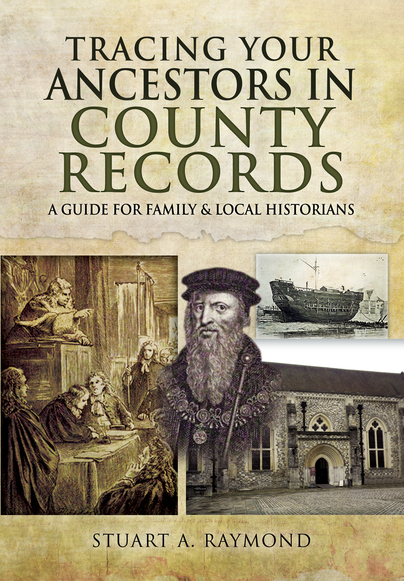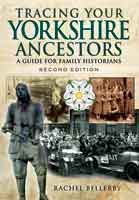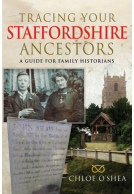Tracing Your Ancestors in County Records (ePub)
A Guide for Family and Local Historians
Imprint: Pen & Sword Family History
File Size: 16.7 MB (.epub)
Pages: 209
Illustrations: 40
ISBN: 9781473879096
Published: 6th July 2016
| Other formats available | Price |
|---|---|
| Tracing Your Ancestors in County… Paperback Add to Basket | £14.99 |
For over 500 years, between the fourteenth and nineteenth centuries, the Justices of the Peace were the embodiment of government for most of our ancestors. The records they and other county officials kept are invaluable sources for local and family historians, and Stuart Raymond's handbook is the first in-depth guide to them. He shows how and why they were created, what information they contain, and how they can be accessed and used.
Justices of the Peace met regularly in Quarter Sessions, judging minor criminal matters, licensing alehouses, paying pensions to maimed soldiers, overseeing roads and bridges, and running gaols and hospitals. They supervised the work of parish constables, highway surveyors, poor law overseers, and other officers. And they kept extensive records of their work, which are invaluable to researchers today.
As Stuart Raymond explains, the lord lieutenant, the sheriff, the assize judges, the clerk of the peace, and the coroner, together with a variety of subordinate officials, also played important roles in county government. Most of them left records that give us detailed insights into our ancestors' lives.
The wide range of surviving county records deserve to be better known and more widely used, and Stuart Raymond's book is a fascinating introduction to them.
As featured in
Who Do You Think You Are
Listed in resources part of Paul Blake article
WDYTYA? Magazine, February 2020
A fascinating book that helps the reader understand the construction of society in the past and how it operated and is well worth the price for the amount of knowledge contained within its pages.
Federation of Family History Societies
This is a fascinating book that helps the reader understand the construction of society in the past and how it operated and is well worth the price for the amount of knowledge contained within its pages.
Family and Community Historical Research Society
In this book, Raymond provides an extensive guide, beyond the obvious parish records covered in his previous book. He has approached this subject particularly from the angle of the public officials who generated the records in the first place: thus here we learn in detail about the work of Justices of the Peace, Lord Lieutenants, sheriffs, coroners and more, many of whom may be somewhat opaque to the average researcher.
Your Family History, October 2016
This allows for coverage of a host of actual types of record, from the more well-known records of Quarter Sessions, for example, to the wider bureaucracy of local government: highway surveys, Poor Law overseers, parish constables, settlement orders, records of religious recusancy, and plenty more besides.
This is invaluable stuff: while other books many mention the records, this volume provides a useful understanding of the processes and public philopsphies that led to them in the first place. There are plenty of references for further reading, too. It's shame, perhaps, that there are no examples of the actual records, but the book is nonetheless packed with background information.
Read it for: An excellent textbook exploring the mechanics of local record-keeping
This book has a broad scope in covering 500 years of Quarter Sessions and other county records prior to the formation of county councils in the late 1800s. The range of records is large and this book provides an introduction to the many topics that can be researched.
Bristol & Avon Family History Society
This great introduction to county records will soon have you chomping at the bit to head to your nearest archive to begin exploring beyond the records available online. Well-known family and local historian (and Family Tree contributor) Stuart A Raymond provides a concise and easy guide to the rich seam of records you can expect to find (and those you can't), going back 500 years to when Justices of the Peace were the embodiment of local government for our ancestors. Understand how and why these records were created, what they might be able to tell you about your ancestors and how to access and use them. With chapters covering Lord Lieutenants and the Militia, Sheriffs, Justices of the Peace, Quarter Sessions Clerks of the Peace (and other officers), trades and occupations, 'paupers, vagrants and lunatics', Assizes and even coroners' records, there's a wealth of information to get your teeth into.
Family Tree, October 2016
As featured in
Wiltshire Times
... plenty of excellent and rewarding material here and coverage of how administrative systems worked is unusually detailed and informative.
Who Do You Think You Are? Magazine, Summer 2016
About Stuart A. Raymond
Stuart Raymond has been studying local history for almost 50 years. He was formerly librarian of the Yorkshire Archaeological Society, and assistant librarian at Deakin University. He has made many contributions to local history journals, and has written numerous handbooks for both local and family historians, for example, The Wills of Our Ancestors, Tracing your Ancestors Parish Records, Tracing Your Ancestors in County Records, Tracing Your Nonconformist Ancestors, Tracing Your Church of England Ancestors, Tracing Your Roman Catholic Ancestors, and Tracing your Poor Ancestors. His recent work, Stourton before Stourhead: A History of the Parish 1550-1750, demonstrates the uses to which the sources described in this book can be put.





















